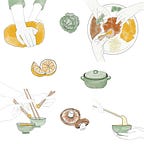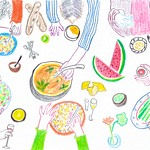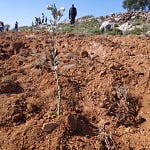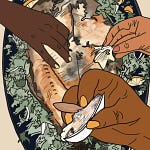Listen now in the player above or visit Feminist Food Stories on Apple or Google Podcasts.
In your city (or area), how do you see food linked to broader patterns of development and economic change? Is it a force for good — revitalizing neighbourhoods and catering to eager tastes? Or is it a harbinger of more sinister changes to come, changes which constrain the ways you live and experience your place?
In this episode of Feminist Food Stories, Isabela sits down with Alison Hope Alkon, Associate Professor of Teaching in the Community Studies Program in the Department of Sociology at UCSC1 and co-editor of A Recipe for Gentrification: Food, Power, and Resistance in the City. Published in July 2020 by NYU Press and focused on large to mid-sized cities in Canada and the US, the edited volume explores the complex links between food, urban development, gentrification, and the right to the city.
Isabela and Alison reflect on the book’s findings to discuss why we should include food in conversations about gentrification, and vice-versa; how to understand gentrification as an outcome of cultural or structural drivers; how well-intended activities like urban agriculture and food activism can inadvertently displace vulnerable communities, and how gentrification links to gender and racial justice.
Credits
This episode features research, writing, and sound editing by Isabela Vera and original music by the Electric Muffin Research Kitchen.
Big thanks to all contributors to A Recipe for Gentrification, whose insights and analysis were instrumental in shaping this interview.
Transcript
A full transcript of the episode is available online here.
Further reading
Alkon, A. H., & Agyeman, J. (Eds.). (2011). Cultivating Food Justice: Race, Class, and Sustainability. The MIT Press. https://doi.org/10.7551/mitpress/8922.001.0001
Anguelovski, I. (2015). Alternative food provision conflicts in cities: Contesting food privilege, injustice, and whiteness in Jamaica Plain, Boston. Geoforum, 58, 184-194. https://doi.org/10.1016/j.geoforum.2014.10.014
Anguelovski, I., Brand, A. L., Ranganathan, M., & Hyra, D. (2022). Decolonizing the Green City: From Environmental Privilege to Emancipatory Green Justice. Environmental Justice, 15(1), 1-11. https://doi.org/10.1089/env.2021.0014
Bonotti, M., Barnhill, A. Food, Gentrification and Located Life Plans. Food ethics 7, 8 (2022). https://rdcu.be/dhzRR
Fullilove, M. T. (2013). Urban Alchemy: Restoring Joy in America’s Sorted-Out Cities. NYU Press. https://doi.org/10.2307/j.ctt21pxmsz
Guthman, J. (2008a). “If They Only Knew”: Color Blindness and Universalism in California Alternative Food Institutions. Professional Geographer, 60(3), 387–397. https://doi.org/10.1080/00330120802013679
Guthman, J. (2008b). Bringing good food to others: Investigating the subjects of alternative food practice. Cultural Geographies, 15(4), 431–447. https://doi.org/10.1177/1474474008094315
Sbicca, J., Kato, Y., Alkon, A. H., & Project Muse (Eds.). (2021). A Recipe for Gentrification: Food, Power, and Resistance in the City. New York University Press.
Smith, N. (1987). Gentrification and the Rent Gap. Annals of the Association of American Geographers, 77(3), 462–465. http://www.jstor.org/stable/2563279
Listener’s note: in the podcast, Alison introduces herself in relation to her previous position, Professor of Sociology at the University of the Pacific, which she held at the time of recording.












